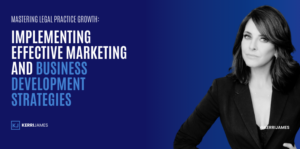Have you ever noticed how the first 60 seconds of a client intake call can make or break trust?
I’ve seen it time and time again. A phone rings at a law firm, an anxious potential client on the line. Maybe their voice is trembling, maybe they’re frustrated, maybe they’re desperate for help. And in that moment, everything hinges on how the intake team shows up.
I’ve watched hundreds of law firms navigate that moment and let me tell you, some stumble, and some shine.
The difference? It’s not whether they use a script. Almost every successful firm I know has some form of intake structure. But the firms that truly stand out, the ones that leave clients saying, “Wow, they really understood me,” are the ones that know how to balance that script with real human connection.
This is exactly what great Legal Intake Specialist Training is all about. It teaches your team to walk that fine line.
Think of it like this:
Too much structure, and the call feels cold, robotic, lifeless.
Too much freewheeling conversation, and the intake rep misses critical details or lets the lead drift away without a clear next step.
The real magic happens in the middle. That’s where your intake team uses the script as a support, not a crutch, and brings their full empathy, warmth, and listening skills to the table.
Today, I’m going to walk you through a practical, detailed call path. Any intake team can follow a roadmap that shows you, step by step, how to blend structure with personalization to turn more leads into loyal, long-term clients.
Because at the end of the day, intake isn’t just about asking the right questions or checking boxes. It’s about building trust, showing care, and creating a relationship from the very first hello.
Ready to transform your intake process? Let’s dive in.
Why Intake Scripts Matter, But Only If You Use Them Right
Let’s get something clear:
Scripts aren’t meant to be cages.
They’re frameworks designed to give your team consistency, cover legal and operational must-haves, and ensure you gather the right data.
According to industry benchmarks, firms with structured intake processes see 20 to 30 percent higher conversion rates. But here’s the twist: When scripting becomes robotic, you lose the magic that turns calls into relationships.
So how do we balance the two?
We follow the call path. This is where Legal Intake Specialist Training becomes essential. It teaches your team how to use scripts as supportive tools rather than rigid instructions, all while nurturing real human connection.
The Call Path Framework
Stage 1: Greeting & Building Rapport
✅ Goal: Make the client feel seen and valued from the first hello.
Imagine you’ve just been in a car accident, or you’re facing a custody battle. You call a law firm.
Do you want someone who sounds rushed, bored, or transactional? Or someone who greets you warmly, uses your name, and reassures you they can help?
Real-World Example:
One personal injury firm I worked with retrained its intake team to pause and acknowledge the client’s emotions right at the start. Within three months, they reported a 12 percent increase in callers who stayed on the line through the full screening process.
Sample Script:
“Hi, this is Jamie at Smith & Co. May I have your name, please? Thank you, [Client Name]. Before we dive in, I just want to say I’m so sorry you’re going through this. We’re here to help.”
Actionable Tips from Legal Intake Specialist Training:
-
Train on tone of voice, not just words
It’s not just what your intake reps say. It’s how they say it. You can hand someone the perfect script, but if they deliver it in a flat, monotone voice, the client will feel like they’re talking to a robot. -
Encourage intake reps to smile while talking
This might sound silly, but I promise you clients can hear a smile. Smiling changes your tone, softens your delivery, and projects warmth over the phone. -
Keep a cheat sheet of empathetic phrases handy
Even seasoned reps can stumble in tough emotional moments, like when a caller shares distressing or sensitive details. Having a go-to list of empathetic phrases helps ensure your team always knows how to respond with care.
Legal Intake Specialist Training emphasizes these subtle, high-impact communication techniques that turn a standard intake call into a trust-building moment.
Stage 2: Screening, Understanding the Story
✅ Goal: Gather key details while making the client feel heard, not interrogated.
Data Dive:
Studies show that clients are more cooperative and forthcoming when intake reps use open-ended questions rather than rigid yes or no checklists.
Sample Script:
“Can you tell me a little about what’s been going on?”
Follow with: “What’s the most important outcome you’re hoping for?”
Real-World Case Study:
A family law firm in Texas switched from yes or no symptom-style screening to a narrative-based approach. The result was a 15 percent boost in qualified leads and far fewer dropped calls.
Actionable Tips from Legal Intake Specialist Training:
-
Create prompts in your script, not word-for-word lines
A script isn’t meant to be something you read line by line. It is a guide to help your team navigate the conversation smoothly. If your reps are reading every word off the screen, they will sound robotic and disconnected. -
Use active listening and repeat back key details
Active listening means showing the client that you understand them. One of the simplest and most powerful techniques is repeating important details. For example, if a client says, “I was rear-ended last Thursday,” the rep might say, “So the accident happened last Thursday. Thank you for clarifying.” -
Prioritize needs over facts at this stage
Details like police reports or medical records can come later. Early in the call, your primary objective is building connection, not collecting paperwork. While those documents are necessary, pushing too hard for them at the start can overwhelm or frustrate a client.
Legal Intake Specialist Training focuses on equipping your team with techniques that encourage storytelling, build trust, and gather essential information without sacrificing empathy.
Stage 3: Selling the Firm’s Unique Value
✅ Goal: Reassure the client they’re in the right place, without sounding salesy.
Clients aren’t just hiring a firm they’re entrusting you with a deeply personal issue.
Expert Insight:
Research shows clients want two things here:
- Competence- you’ve handled cases like theirs.
- Care – you understand what matters to them.
Sample Script:
“We specialize in cases just like yours, and our team has helped hundreds of clients get the outcomes they deserve. What’s most important to you in working with a firm?”
Real-World Example:
A workers’ compensation firm we consulted began training intake reps to mirror client language when describing firm strengths (if a client says “I need someone aggressive,” the rep emphasizes the firm’s assertive approach). Their same-day sign-up rates jumped by 18%.
Actionable Tips:
- Avoid overloading with credentials and focus on relevance. It’s tempting to rattle off your firm’s full list of achievements, awards, years in business, notable cases but here’s the truth: clients don’t need your entire resume. They need to hear what’s relevant to their specific situation.
- Use client testimonials or case examples where appropriate. Storytelling is powerful and nothing builds confidence like hearing, “We’ve helped someone just like you.”
- Ask what they value most, then reflect it back. The most personalized moment on the call comes when you stop assuming what matters to the client and start asking. For one person, it’s speed. For another, it’s compassion. For someone else, it’s an experience.
Stage 4: Signing or Scheduling Moving the Lead Forward
✅ Goal: Convert the lead or secure the next step clearly and confidently.
Deeper Data:
According to legal marketing benchmarks, firms that directly ask for next steps close leads 25–30% more often.
Sample Script:
“Here’s what we can do next: we can set you up with a free consultation this Thursday at 2 pm. Does that work for you?”
Real-World Example:
A bankruptcy firm improved their booking rate by 20% after teaching intake reps to stop saying, “Would you like to schedule?” and instead say, “Let’s go ahead and schedule…”
Actionable Tips:
- Offer specific time slots, not open-ended options. When it’s time to schedule the next step whether it’s a consultation, document review, or follow-up call specific beats vague every time. Saying “When would you like to come in?” puts the burden on the client to decide, often causing hesitation or delays.
- Clearly explain what happens next (who they’ll meet, what to bring). Clients feel more secure when they know what’s coming. Uncertainty creates hesitation but clarity builds confidence.
- Train on handling objections confidently. Even the best-trained reps will face objections like: “I need to think about it.”, “I want to talk to another firm first.”, “I’m not sure if I can afford this.”
The key isn’t to pressure it’s to stay calm, show understanding, and guide.
Stage 5: Closing with Care
✅ Goal: Leave the client feeling confident, cared for, and clear on next steps.
Sample Script:
“Thank you so much for sharing all of this with me today. Just to confirm, we’ll see you Thursday at 2 pm. If you have any questions before then, you can reach me directly at this number.”
Actionable Tips:
- Always summarize key details before ending. Before you wrap up a call, it’s critical to recap the essentials so the client feels clear, confident, and knows exactly what to expect. This reduces misunderstandings, avoids follow-up confusion, and reassures the client you’ve truly listened.
- Offer direct contact information for follow-ups. Clients want to know they’re not just entering a black hole after the call; they want a real point of contact they can reach if questions or concerns pop up.
- End on a warm, positive note “We’re looking forward to helping you”. First and last impressions matter. A positive closing reinforces the relationship you’re building and leaves the client with a sense of hope and support.
Training Your Team: Practice, Feedback, Repeat
Even the best script will fail if your team isn’t actively trained and reinforced.
I can’t tell you how many firms I’ve seen roll out a beautifully crafted intake script, only to watch performance slip over time because they set it and forget it.
Here’s the truth: intake mastery isn’t a one-time training event. It is an ongoing, evolving process. This is the heart of effective Legal Intake Specialist Training.
Role-Playing Exercises Using Real Past Calls
The fastest way to build real skill is simple.
Practice under pressure.
Live role-plays allow reps to simulate real client conversations in a safe environment where they can try, fail, and improve without risk.
Practical tips:
-
Use actual client scenarios from past calls, especially ones where the rep struggled or the call went off script.
-
Rotate roles. Let intake reps play both the caller and the staffer to deepen empathy.
-
Keep the tone supportive, not punitive. Role-playing is about growth, not punishment.
Example exercise:
Have one rep play an upset client while the other practices handling objections confidently. Swap roles, then discuss as a group: What worked? What could be improved?
Call Reviews to Highlight What Worked and What Needs Adjustment
Listening to recorded calls is one of the most powerful training tools you have.
Why? Because you can pinpoint exactly where things went right or where opportunities were missed. Legal Intake Specialist Training often incorporates call reviews as a core learning tool.
Practical tips:
-
Set up a regular call review schedule, such as one call per rep per week.
-
Focus on both strengths and weaknesses. Praise great moments, not just mistakes.
-
Involve the rep in the review. Start by asking, “How do you think that went?”
Example:
Play back a call where the rep rushed through the summary at the end. Pause and discuss how slowing down and using more deliberate language might improve client confidence.
Tracking KPIs: Conversion Rates, Average Call Time, Satisfaction Scores
Without clear metrics, you can’t tell if your training is working.
Key KPIs to track:
-
Conversion rates: How many qualified leads turn into signed clients?
-
Average call time: Are calls efficient but still personalized?
-
Satisfaction scores: If you do post-call surveys, what do clients say?
Practical tips:
-
Share team-wide dashboards so reps can see progress and trends.
-
Set clear, achievable goals, such as increasing conversion by 5 percent this quarter.
-
Celebrate improvements publicly. Even small wins build momentum.
✅ Pro Tip: Invest in Coaching, Not Just Compliance
Here’s the big mindset shift:
Your goal isn’t just to make sure reps are following the script. It’s to help them own it, internalize it, and bring their best selves to every call.
This is where Legal Intake Specialist Training shines by promoting a coaching-based culture instead of rigid oversight.
Practical tips:
-
Pair newer reps with senior coaching buddies for peer learning.
-
Run monthly workshops focused on specific skills, such as handling emotional callers or improving upsells.
-
Give managers dedicated time for one-on-one coaching, not just supervision.
Example:
Instead of just auditing calls for errors, set up regular coaching conversations where you ask:
-
“What part of the script feels most natural to you?”
-
“Where do you feel you’re still struggling?”
-
“What support would help you feel more confident on tough calls?”
Tech Tools: Supporting (Not Replacing) Human Touch
Technology should amplify your team’s effectiveness.
Recommended Tools:
- CRM systems: Track prior interactions, notes, and outcomes.
- Dashboards: Visualize key metrics and trends.
- AI prompts: (Yes, we’re here already!) Nudge reps when emotional cues or high-value leads are detected.
Overcoming Common Challenges
- “Our team doesn’t like scripts.” → Show them the script is a safety net, not a cage.
- “Personalization takes too long.” → Actually, it saves time by reducing back-and-forth.
- “Our clients don’t want to be sold.” → Selling is just showing how you can help it’s about trust, not pressure.
Final Takeaway: Master the Dance of Structure and Heart
The most successful intake teams don’t choose between structure or personalization; they master the dance between both.
Every call is an opportunity to turn a lead into a lifelong client. It’s not just about memorizing lines or hitting quotas; it’s about building confident, empathetic professionals who can guide people through one of the most important decisions of their lives.
To get there, you need the right system, the right training, and a culture of continuous improvement. You need to invest in tools and processes that enhance not replace the human touch.
At KerriJames.co, we believe intake excellence isn’t just about process, it’s about people, heart, and results. Because when your intake team balances structure with authenticity, you don’t just win cases you win trust.
💡 Want Help Getting Started?
If you’d like, I can help you create:
A ready-to-use training plan
Detailed coaching checklist
A practical role-play script packet for your managers
Just say the word! 🌟 Let’s build an intake process that transforms every caller’s experience and drives your firm’s success.









